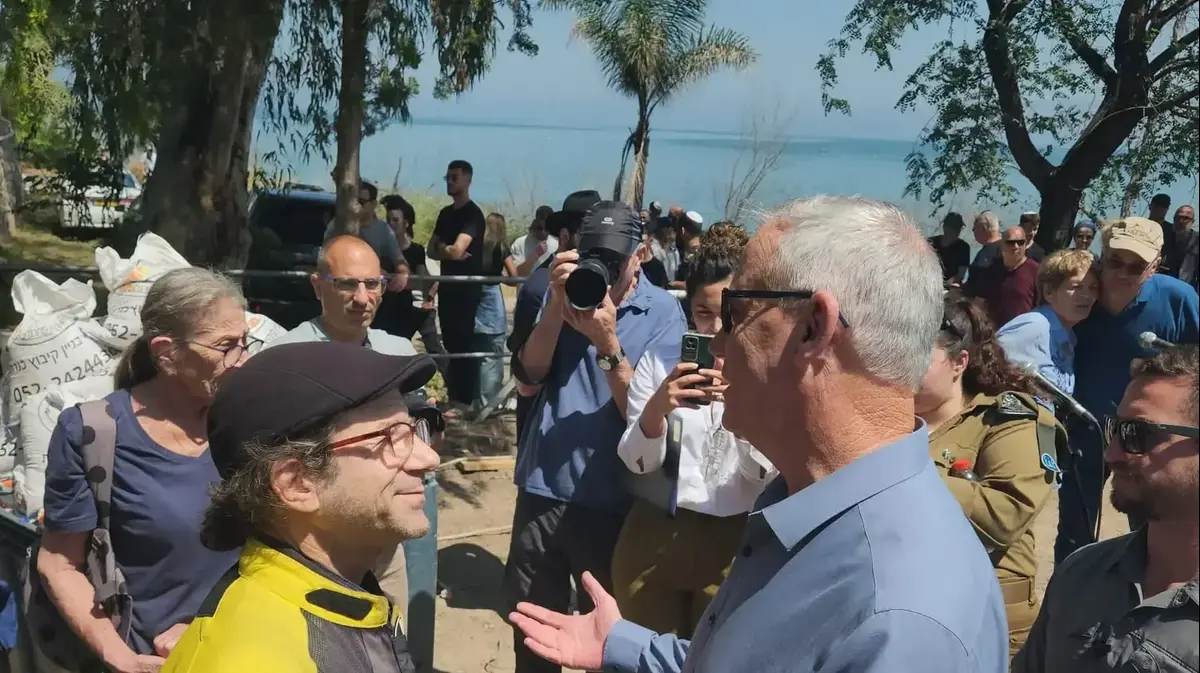The State of Israel has already experienced its own "attack on the Capitol" event, 69 years before the one that shocked Washington. On January 7, 1952, while the Israeli Knesset was debating the government's proposal to open negotiations with the West German government on a reparations agreement for the welfare of Holocaust survivors and their absorption in the young Jewish state, an extremely stormy demonstration was held in Zion Square in Jerusalem by those opposed to any connection with Germany, a total of seven years after End of World War II.
The main speaker at the demonstration, the chairman of the Harut party, Menachem Begin, inflamed the spirits: "This government that will open negotiations with the murderers who are destroying our nation, will be a malicious government that will base its rule on bayonets and grenades... When you shot us with a cannon, I said no," Begin stated in front of Thousands of opponents of the negotiations, referring to his refusal to start a fratricidal war after the "Altalana" ring, "Today I will give the order: yes!" The Knesset was then located in Beit Fromin, near the square. After Begin's speech, the demonstrators began marching towards the Knesset. Police, who set up roadblocks in nearby streets , were unable to control the crowds of angry protestors, some of whom reached the doorstep of the Knesset and began throwing stones at the plenary hall. Several members of the Knesset were injured before the demonstrators were removed.
Israel in those days resembled a country on the brink of civil war.
The intention of the prime minister at the time, David Ben-Gurion, to negotiate directly with the Germans for receiving reparations less than seven years after the liberation of the extermination and concentration camps where 6 million Jews - one third of the entire Israeli population - were murdered, divided the public in Israel.
At the end of three days of discussions, the government's proposal passed with a majority of 61 supporters against 50 opponents.
The Chancellor of West Germany, Konrad Adenauer, is also facing strong domestic opposition to the payment of any reparations to Israel and the Jewish people.
Only 11 percent of West Germans believed that Germany should pay the Jews reparations.
Public opinion polls conducted by the Allies in Germany in those days placed the Jews at the bottom of the list of victims of World War II.
The Germans were busy rebuilding their country and negotiating the payment of reparations to the Allies for the war damages, and saw no reason to compensate the Jews.
And if that wasn't enough, on March 27, 1952, a letter from Molkad, intended for Chancellor Adenauer, whose senders were Jews opposed to the reparations negotiations, exploded.
In this extremely charged atmosphere, explosive, sensitive and complicated negotiations on the payments began in the castle of Oud Vesnaar, not far from the Dutch capital The Hague, in complete secrecy.
West Germany conducted separate negotiations with Israel and with the representatives of world Jewry, who united under a new body established for the purpose: the "Claims Conference".
After six months of negotiations interspersed with crises, the two agreements were signed at the Luxembourg City Hall by Chancellor Adenauer, Israeli Foreign Minister Moshe Sharett and Jewish leader Nahum Goldman of the Claims Conference.
Germany pledged to pay Israel 750 million dollars in goods and services.
The Claims Conference received an initial sum of 107 million dollars for reparations to Nazi victims.
These were quite low amounts compared to the demands of Israel and the Claims Conference.
Is it even possible to compensate?
On the 70th anniversary of the signing of these agreements, which paved the way for the normalization of relations between Germany and Israel and the Jewish world, a film by Jewish-American director Roberta Grossman, "Soul Reckoning", is being released these days, documenting the many difficulties that accompanied the negotiations on the reparations agreements on the part of all involved.
In the film, which was recently screened at the Jerusalem Jewish Film Festival, Holocaust survivors who agreed to accept the reparations and those who refused testify, the last surviving participant in the negotiations, the Jewish-American jurist Benjamin Franz - who was also a prosecutor in the Nuremberg trials against the Nazi criminals, the grandson of Adenauer and the son of Server.
Grossman, whose family immigrated to the US even before World War I, first became aware of the issue of reparations only when she was working on a documentary about the secret archives of the Warsaw Ghetto and when she received a financial grant for it from the Claims Conference. Israel and the Claims Conference were very worried about the identity of the subjects and the German givers. "The Israelis and the Jews were very worried that when they entered the hearing room, they would find themselves facing Nazi criminals," says the director, "to a certain extent this was the case, because they carried and gave with a government that came in the place of a government the criminals
But the people they met were partly opponents of the Nazi regime.
Many of the Israeli subjects and givers were German Jews, who immigrated to the Land of Israel before the war or after surviving the war.
One of them suddenly discovered that he went to the same school in Weimar where one of the German subjects and givers studied before the war."
Talking to the Germans about financial reparations only seven years after the end of the Holocaust was a very complex situation for the Jewish side.
"Feelings on the subject were very upset," Grossman emphasizes, "There was a significant part of Israel that was very opposed to negotiations with the Germans. They felt that it would be unconscionable to talk about money with the murderers. And there were those who had the other opinion, that conscience should be put aside and something should be done to help the survivors There was very high tension before they entered into negotiations not only in Israel, but also in many parts of the Jewish world. Survivors were divided between those who found a way to agree to receive money from the Germans and those who thought it was horrifying to even think that someone could receive money to somehow compensate for the loss of their parents, brothers, their sisters and their families.
"Ultimately, it was decided to do something to help the survivors get back on their feet and to help Israel in times of very severe economic distress, which could have led to the end of the Israeli attempt to establish a state immediately after it began. At the time, Israel was faced with very difficult economic consequences of the War of Independence and the high costs of About 700,000 refugees came to Israel within a year or two, of which about 400,000 were Holocaust survivors. The number of refugees taken in was greater than the entire population of Israel at the time. It was a very heavy economic burden, and Israel urgently needed financial aid."
To this day there are many Israelis who say that the reconciliation with the Germans on the basis of reparations was too quick and too early. Have you asked yourself whether the decision to accept the payments was the right one?
"Of course, and I believe it was the right decision. Nothing is perfect. Adenauer was sincere in his desire to pay reparations as a form of apology, and he did his best to help. Of course, he had realistic political considerations, chief among them the desire to return Germany to the bosom of the nations of the world. In the end , survivors who were homeless, who had no parents and education, who were physically and emotionally broken, needed help, and also a certain kind of recognition and apology from Germany. Emotionally and financially, this agreement was important."
Last Chance
Greg Schneider, Vice President of the Claims Conference, points out that, contrary to popular opinion, the reparations were not "money for blood": "From the Jewish and Israeli point of view, the moral dilemma was related to sitting in the same room with the Germans only seven years after the liberation of the camps. Everything was still very fresh and full of emotions The issue of looted property, as well as compensation for suffering and damage to health, was in the negotiations. Although those who were in the discussion room from the German side were not ex-Nazis, the whole idea of sitting down with Germans and discussing compensation for survivors seven years after the Holocaust was difficult. It was almost impossible. To imagine that people from both sides were able to sit together in the same room.
"The film 'Soul Reckoning' is also about the emotional journey of the survivors in receiving the money. The check they receive every month as compensation is a reminder of what they lost and what was taken from them. It is a very unique story about the Jewish people, but at the same time it has a universal lesson. The idea that Jews could sit In one room with Germans in 1952 gives hope for reconciliation between groups that are in conflict. This is an important message in the dark times the world is experiencing today."
Another misconception is that the agreement included a final amount of reparations, which is why many Germans talk about the need for a "finish line" to deal with the Holocaust and the money demands of the Jews.
In retrospect, to date, Germany has paid approximately 90 billion dollars in reparations to Holocaust survivors.
"After all, the suffering of the survivors continues even today," explains Schneider, "it is about helping to deal with the suffering - providing home care, medical care, transportation, psychological help, social programs. All of this is dealing with the consequences of the Holocaust, which are very present in the lives of the survivors. People who They were 15 years old during the war and today they are in their 90s suffering from nightmares about what happened to them in their youth. Some people suffer physically from what they experienced at that time or from the consequences of deprivation.
"The annual negotiations we still have with Germany are not about money. We talk about the status of the survivors, how many of them are still alive, what they went through and how the German government can help them. As long as the suffering continues, the negotiations will continue, and the German government has agreed to this. We have There are differences of opinion about the size and nature of the aid, but at least today the German government accepts the concept that it must continue to help deal with the consequences of the Holocaust. In recent years, there has been an understanding in Germany that this is the last chapter of reparations and the last chance to do the right thing. There is a new generation of government officials, who understand that they will be Those who will write the last words regarding the way Germany conducted itself in this issue of reparations, and that puts a lot of responsibility in their hands."
Opposition from the right and the left
Israel's opposition to negotiations with the Germans did not come only from the right-wing camp, the secretary of the historian Dr. Yaakov Tobi, a researcher and lecturer at the University of Haifa, who deals with Israel-Germany relations and one of the interviewees in "Soul Account": "The negotiations were opposed by PMM - the Zionist left, Mc Y (the Israeli Communist Party) - the anti-Zionist left, and freedom from the right.
A fourth factor was the General Zionists, a center-right party, but their opposition was more self-interested.
There were also non-political bodies that opposed, first and foremost organizations of Holocaust survivors and alongside them the commercial press - 'Maariv', 'Yediot Ahronoth', student organizations and the like.
"There was conscientious-principled-historical opposition to direct talks with the murderers so soon after the terrible event of the Holocaust. They saw this as a desecration of the memory of the millions of those who were murdered, a form of humiliation for the hundreds of thousands of Holocaust survivors who lived in Israel and abroad, the bloodshed of Israel, a humiliation of Israel's honor in my eyes The peoples who saw how the people of Israel ran to ask for money.
This is the aspect that was used by Harut absolutely.
And there was also a political aspect of opposition to Mapai's rule. According to my analysis, the main aspect of opposition on the part of Herut was ideological.
It also stemmed from the personal biography of Begin, whose family perished in the Holocaust.
Regarding MK, the main aspect of resistance is not ideological but political - the struggle between East and West. Negotiations with West Germany are essentially Israel's approach to the Western camp, and this means that it is a denial of the USSR and East Germany.
Mapam's position was a combination of Harut's and MKI's positions.
I mean, there is a clear ideological aspect there.
It should be remembered that MPAM officials and public figures who supported it were well-known Holocaust survivors. On the other hand, there was also a self-interested political aspect related to the pro-communist/Marxist view, in which negotiations with West Germany was a rapprochement with the Western world."
How did these parties react to the argument of the government at the time, that German aid is essential for the continued existence of the young state of Israel?
"Both camps, the one that opposed the negotiations and the one that supported it, had a group of main arguments, one of which stood out above the rest. For the government, the prominent argument was that the reparations would restore the State of Israel, allow it to exist and prevent a second Holocaust in the face of an existential threat from the Arab side. For the camp that opposed the argument The main thing was that the move would lead to reconciliation between Israel and West Germany, and that the entire moral-conscience establishment of boycotting Germany and the German people for generations following the most terrible crime in Jewish history would collapse and normalization would take place - which really happened.
"When the opposing camp was required to respond to the argument that the reparations would save Israel, he said that the Germans would not transfer the funds, since the German people are known as liars and do not keep their word, so the government's hope that the reparations would save the country has nothing to be based on. Another argument was that the Germans would not transfer goods to Israel in the amount and in the quality required. Beyond that, they claimed that as soon as Israel accepts the reparations agreements, if it does accept, it will lose financially from other directions. The US will stop helping Israel with loans, and world Jewry will not help Israel.
It is also claimed that the amount that Israel is demanding from the Germans does not at all reflect the loss caused to the Jewish people in the Holocaust, and is not a large enough amount.
It is further claimed that the future moral damage as a result of this negotiation will have heavier consequences than not receiving the funds."
Fast normalization
Israel conducted the negotiations with West Germany, from which it also received the reparations.
From the other side of the wall in those days, the pro-Soviet government of East Germany ruled, with whom Israel did not negotiate reparations and to this day has not demanded from it its share of the payments.
"East Germany was a branch of the USSR," explains Dr. Tobi, "the USSR had no interest in East Germany paying reparations to Israel or the Jews.
From 1950, Israel began a Western orientation, and Moscow did not want to help such a country receive economic aid from its own country.
There was also disguised anti-Semitism among the communists, which did not contribute to the desire to give compensation money to the Jews.
The USSR felt that it was the country that suffered the most in World War II, and therefore it was the first to receive reparations. Moscow suspected that if East Germany agreed to pay reparations to Israel, other countries would also fall in line.
"When Israel sent letters to the four occupying powers and demanded reparations, the Soviet Union from the beginning refrained from responding or responded negatively.
The Israeli Ministry of Foreign Affairs decided to keep the demands vis-à-vis East Germany on the backburner, since the West German course had begun to develop.
In Israel they came to the conclusion that if they try to push East Germany and it will not yield anything, it will discourage West Germany from moving forward and this will have a negative effect on the negotiations.
After the signing of the agreement with West Germany, Israel renewed its attempts with the East through various diplomatic channels, mainly through the USSR because there were no diplomatic relations between Israel and East Germany, without any success. In the late 1980s there was an attempt to settle the matter in a way that did not mature. According It is estimated that united Germany gave East Germany's share of the reparations through the donation of the first two submarines that Israel received following the Gulf War. The words were not said out loud, so that other countries would not claim reparations at the expense of East Germany."
Looking from today, which of the two camps in Israel was right, in your opinion?
"There were two worldviews: Ben-Gurion's, the pragmatic and the realistic, which says that the State of Israel, which was then in the most terrible situation in its history, should be revolted against the emotional-value view of Begin. At one of the government meetings in 1951, Minister of Finance Eliezer Kaplan said: 'There is We have fuel for one month. That is, after a month factories, agriculture, and the army could not be operated. In fact, there is no state. Ben-Gurion said: 'We do not need to experience a second Holocaust, this time from the hands of the Arabs. We will take any help we can get to build the the state'.
"Begin claimed, for his part, that a nation that does not know how to remember its history has no future, and that this will be reflected in various aspects and will be translated into the attitude of the nations of the world towards Israel and the attitude of the country's residents towards the country. He believed that the practical aspects would undermine the moral existence of the country, and that this is no less serious than a danger The physical-economic existence.
"A Bank of Israel study published at the end of the payment period claimed that it would have been possible to restore the country's economy from its dire state in the early 1950s by raising more funds from world Jewry and the United States, further tightening of the belt and a more assertive economic plan, but it would have taken more time.
In my opinion, the only thing Israel lacked at that time was time.
Arab countries have declared day and night their intention for a second round of fighting, in which they will learn the lessons of the defeat in '48 and destroy the Jewish state.
Between the fear of being physically wiped out and the fear that the move against Germany would corrupt public morality, between the urgent and the predictable, the urgent was more important.
However, one can ask whether the accelerated normalization that followed the reparations agreement was desirable."
were we wrong
We will fix it!
If you found an error in the article, we would appreciate it if you shared it with us









